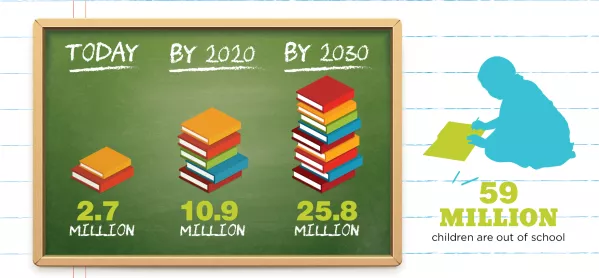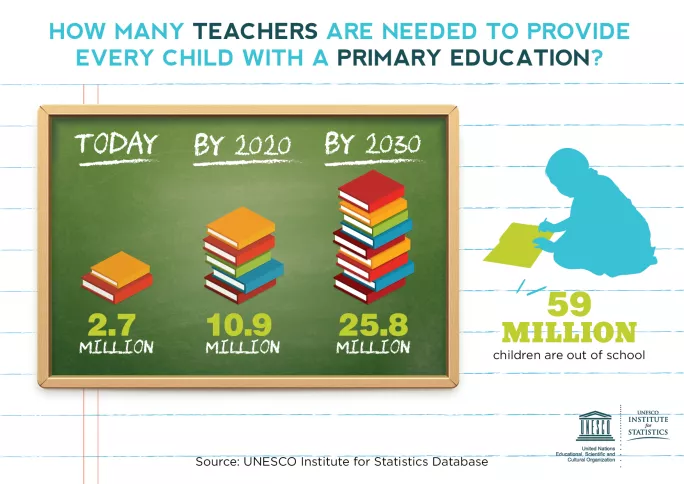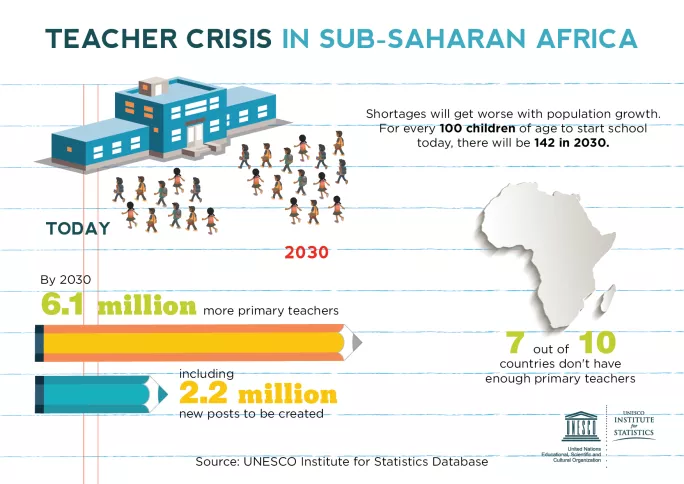At the United Nations last week, the world’s leaders adopted 17 ambitious Sustainable Development Goals (SDGs). Education is at the top of the agenda, thanks to the advocacy and insistence of students, teachers and the larger education community. Within the goal of inclusive and equitable quality education there are 10ten targets, ranging from universalising early childhood education opportunities to closing the achievement gaps in all countries. The leaders clearly recognise that education is crucial for achieving all the other goals - from women’s health to gender equality and environmental protection.
Yet one glaring fact shows that we are heading for a major collision between ambitions and reality: the world will need to recruit 25.8 million school teachers to provide every child with a primary education by 2030, according to a new paper from the Unesco Institute for Statistics (UIS).
In addition, if we were to take Malala’s challenge seriously - “one child, one teacher, one book and one pen can change the world” - we already need an extra 2.7 million teachers in classrooms today to reach the 59 million children who are denied the right to primary education. And this is just the beginning, with Malala pushing towards universal secondary education for all. That means every single child in every single country, not just trained teachers for rich countries and a cheap, low-quality substitute for poor countries.
Teachers agree. When Education International surveyed more than 15.000 teachers last year for World Teachers’ Day, in the largest poll it ever conducted at classroom level, more than 50 per cent identified the current teacher shortage as a major threat to both the equity and quality of education. It is no surprise, for example, that data from the OECD’s Talis survey also found burnout caused by large class-sizes.
Today, 96 countries are still struggling to achieve universal primary education (UPE). According to UIS projections, only 37 countries (39 per cent) will have enough primary teachers in classrooms by 2020; the proportion will rise to 56 per cent by 2025. However, at the current rate, 33 countries (34 per cent) will still not have enough teachers to achieve UPE in 2030 (explore the data with the Unesco eAtlas of Teachers).
Seven out of 10 African countries face an acute shortage of teachers
Sub-Saharan Africa faces the greatest challenges, with a total of 2.7 million teachers needed in schools today. And the situation is likely to get worse as the region struggles to accommodate a growing school-age population.
For every 100 children of age to start school today, there will be 142 in 2030. As a result, countries across the region will need to create 2.2 million new teaching positions by 2030 while filling about 3.9 million vacant positions. In the rush to recruit more teachers, many countries are forced to hire people with little or no training. UIS data show that in one third of all countries, less than 75 per cent of teachers were trained according to national standards.
The effects of the global teacher shortage will have a devastating impact on the education system of individual countries, but also on the development of entire regions, spanning from the short- to the long-term. The goal of investing a substantial amount of state budgets in education, equal to at least six per cent of GDP, has yet to be achieved for many countries, particularly in Africa. Countries across the region lack the incentives needed to ensure an adequate supply of teachers, which leads to overcrowded classrooms, and the hiring of unqualified personnel. This is why Unesco and Education International are advocating for renewed government and donor commitment to secure sufficient funding and the involvement of teachers and their representatives in the development of national plans to address the shortages.
Career progression and opportunities to work in other areas of education, such as curriculum development, textbook writing and teacher-training programmes, would help to retain teachers and motivate them to improve their professional and academic skills. Through better workforce planning, raising the standards for entering the profession and recruiting more qualified candidates, countries can tackle shortages and ensure that the most motivated candidates enter and remain in the profession.
Ultimately, the new international education goal will remain just that - a goal - without urgent action to address the chronic teacher shortages. In response, the international community has also pledged to increase substantially the supply of qualified teachers, especially in the least-developed countries.
But the data show that in the rush to get more teachers into classrooms, many countries resort to hiring staff with no or little training. By placing quantity over quality, these policies can ultimately harm generations of children, striving not just to enrol in school but learn the most fundamental skills.
Does your country face a teaching shortage? Explore the data in the Unesco eAtlas of Teachers.


